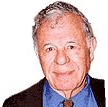
Amitai Etzioni
http://www.jewishworldreview.com --
DESPITE Sept. 11, despite massive job layoffs that added another layer of grief
for many American families, 2001 was quite a stellar year, which augurs well
for the future.
Before Sept. 11, America's heroes were an embarrassment. The very fact that most who were worshiped were not true heroes, but celebrities - movie stars on their -nth divorce, overpaid, self-indulgent basketball jocks and bratty tennis players - speaks volumes. Occasionally, a real one broke through, but popular culture was overshadowed by singers whose lyrics most newspapers would not print and the conspicuous consumption of the super-affluent.
Sept. 11 restored true heroes as American role models: firefighters and police who rush into burning buildings to save others; airline passengers who refused to be taken like lambs to the slaughter. America's youth, sent to do battle in a faraway, desolate country, had no qualms this time about what they were fighting for. Their parents - and the rest of us - can proudly salute them in ways we have been yearning to ever since the Vietnam War.
The spirit of community soared. New York City, once considered a foreign place that Americans loved to hate, was embraced by citizens coast to coast. Volunteers rushed to "Ground Zero" from all over the nation to help. Donations - from multimillion-dollar corporate grants to kids sending a dollar apiece - poured in. Above all, there was a sense of coming together, of one nation after all.
AWARENESS, ACCEPTANCE IMPROVE
Much was made out of the "racial" profiling of young male Arab-Americans
and of some deplorable incidents of violence against Muslim Americans. But
most Americans rushed to protest such abuses. Awareness soared; today,
you can hardly attend an interfaith service without finding a Muslim clergy
member on the platform.
Sept. 11 gave us a president who is a national leader. No one asks anymore whether George W. Bush is cut out to lead the world's biggest power. Bush's tentativeness has been replaced by a man who is sure of his calling, who can articulate with rare clarity our purpose, without false promises of quick, easy solutions.
A renewed spirit of community has been felt in Congress and many state capitals. Much of the standard bipartisan bickering has faded, for now.
2001 also witnessed an astonishing sea change in the public's attitudes toward government. Long considered part of our problems, the government now is seen as our protector. Patriotism, along with the American flag itself, reappeared throughout the land.
CHANGES ON CAMPUS
No place is the change in patriotic sentiments more evident than on college
campuses, still the places from where most of the critics of whatever America
does mount their salvos. Now, many students are lining up for jobs in the CIA
and FBI rather than protesting these agencies' actions. ROTC, long
unappreciated, is welcomed on campuses again.
Perhaps most lasting is that we finally put Vietnam (and Somalia) behind us. We learned we must be in the world, unable to rest safely within our own borders. The Gulf War restored our confidence, some; the campaign in Kosovo helped; but historians will write that it was Sept. 11 that made us true internationalists, willing to assume in full our mantle as a world power as we lead a global anti-terrorism drive.
There have been bumps in the post-Sept. 11 road, and more sure to come: We had a spirited debate (as only a free society can) about recalibrating our civil liberties to enhance public safety. The economy tanked; although there are signs of recovery. And here and there signs of partisanship have reappeared.
All in all it has been the worst of times, the best of times: a year we suffered a
horrible blow, and one from which, tested, we emerged with our colors
JWR contributor Amitai Etzioni, of George Washington University, is the author of, among others, The Limits of Privacy. Comment by clicking here.
12/27/01: Where children must write their PARENTS notes
12/20/01: American extremists
12/13/01: Homeland defense is best option for volunteerism
11/11/01: Can we force democracy on the Afghans?
11/08/01: How not to win the war
10/01/01: Problems with the new antiterrorist agenda is not that it is too grand, but that it is not grand enough
09/21/01: Either U.S. forces should strike back hard or we'll lose our freedoms
09/05/01: Communities, not the president, must enact morality
08/23/01: Economists fail as forecasters
08/09/01: Live from Washington it's …. "Everyone's a Criminal"
07/27/01: Condit case illustrates the need to rein in fast-talking lawyers playing verbal acrobatics with the truth
08/01/01: Shouting 'Big Brother' in a crowded society
